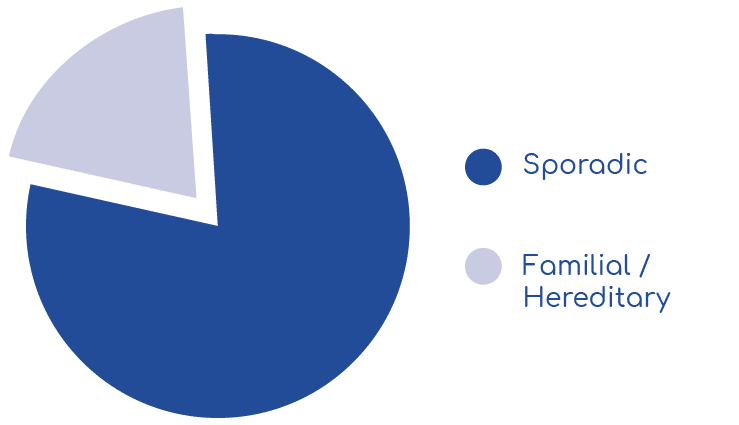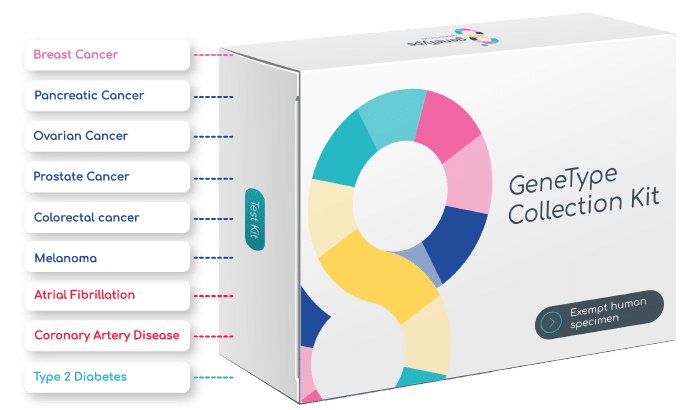What if you could more accurately predict your patients risk of colorectal cancer?
The geneType for Colorectal Cancer risk score integrates broad genetic testing with traditional risk assessment modelling to provide a highly accurate personalised – and actionable – risk prediction.¹


Most people with colorectal cancer have no significant family history of the disease.²
Around 30% of all colorectal cancer cases are due to a hereditary contribution, family history, or a combination of both. The other 70% of people have no family history of the disease and no hereditary contribution.²
Despite this, current risk assessment models focus on family history.¹
GeneType for Colorectal Cancer looks beyond family history – integrating genetic data with familial and clinical factors to more accurately estimate colorectal cancer risk.
Colorectal cancer is on the rise in adults under 50 years3
Screening guidelines have tried to address this issue by lowering the National FOBT screening recommendation age to 45.4
Patients are already stratified by family history, race/ethnicity and inflammatory bowel disease to assist with tailoring screening options.
Take risk stratification one step further by understanding your patient’s “baseline” risk with geneType.
*geneType is not a replacement for CRC screening; it is a risk assessment to help inform better screening and risk-reducing recommendations. This does not test for hereditary genetic syndromes associated with CRC.

Australia has the highest incident rates of colorectal cancer globally.5
How can you help your patient’s?
- Identify your patient’s that need screening earlier than National population screening guidelines recommend.
- Let geneType help you manage compliance rates. Understand the risk of your non-compliant screeners.
- Identify your patient’s that would benefit from colonoscopies in addition to FOBT.

The geneType Patient
GeneType for Colorectal Cancer is appropriate for:
- Men and women
- Age 30 – 85 years
Exclusion criteria include a personal history of CRC, carrier of a known hereditary cancer syndrome (i.e. Lynch or FAP).
geneType does not test for hereditary cancer syndromes.

One report with actionable insights
GeneType reports are structured to make the results easy to interpret and communicate to a patient.
The geneType for Colorectal Cancer report includes:
- snapshot of your patient’s 10-year and remaining lifetime-risk scores
- interpretation of what their risk scores mean in the context of your local guidelines
- polygenic risk score accounting for the additional 140 SNPs that may influence their breast cancer risk
- information about managing colorectal cancer risk factors
- and the types of screening and interventions that may be relevant to risk category
Testing is simple

Step 1
Register as a provider; our team will provide clinical education and other resources as needed.
We will send kits to your clinic to have on hand.

Step 2
Discuss geneType™ with your patient.
Would geneType™ help them qualify for additional risk reduction strategies?

Step 3
Complete the Test Requisition form, collect a saliva sample from the patient with the collection kit provided and return both to Rhythm.
You will have the option to use a paper requisition, or a secure, compliant portal to complete the ordering process.

Step 4
Leave the rest to us.
We will notify you when your patient’s results are ready.
You will have the option to request a consult with a genetic counsellor, whether to review your patient’s results and/or to follow-up with your patient, as needed.

Integrated risk assessment models improve population-based screening
Integrating the SNP-based polygenic risk score with clinical risk factors significantly improved risk prediction.¹
Have your patients got questions?
We have answers.
If your question is not shown here, please contact us directly.
What will my geneType for Colorectal Cancer results tell me?
Your results will tell you, based on genetics and other risk factors, your risk for developing sporadic colorectal cancer over two different time periods: the next ten years and in your lifetime. Your risk will be compared to the average risk for someone of your age, ethnicity, and sex. You and your healthcare provider can use this information to develop a personalized screening and risk reduction plan.
How does geneType for Colorectal Cancer assess my risk?
GeneType for Colorectal Cancer combines several of your risk factors, such as age, family history, and your DNA markers, into one comprehensive risk assessment.
Is geneType for Colorectal Cancer a blood test?
No. GeneType for Colorectal Cancer is a DNA test collected with a saliva tube. You will spit into the tube to collect the sample.
What are DNA markers?
“DNA markers” is a simple term we use to describe small differences in DNA between individuals. GeneType for Colorectal Cancer looks at DNA markers that have been scientifically proven to be associated with colorectal cancer.
What is a polygenic risk score?
A polygenic risk score (PRS) combines the effects of multiple DNA markers to rank your risk against that of the general population. While one or two DNA markers don’t have a strong influence on risk, many markers together can have a large impact. Your polygenic risk score adds up the effects of over 40 DNA markers.
Will insurance cover this test?
This test is not generally covered by insurance. Your ordering healthcare provider will discuss the cost of the test with you. A credit card authorization form will be included in the test kit that lists the payment options.

*Patient eligibility dependent on personal medical history, age and sex
Interested in ordering more than one disease? Order geneType™ Multi-Test.
The Multi-Risk suite of tests is for adults 40-85 years of age. At maximum, a woman would be eligible for eight diseases in the panel; a man would be eligible for seven. Starting at age 30, a patient may qualify for geneType's™ cancer risk assessments only.
Are you ready to get started with geneType?
The first step is to trial geneType at your practice.
References
- Gafni A et al. PLoS One 2021;16(9):e0251469.
- Bowel Cancer Australia. Non-modifiable risk factors. Available at: https://www.bowelcanceraustralia.org/non-modifiable-risk-factors. Accessed November 2021
- Garrett C. et al. Early-onset colorectal cancer: why it should be high on our list of differentials. ANZ J Surg. 2022;92(7-8):1638-1643. doi:10.1111/ans.17698
- Bowel Cancer Screening | Cancer Council NSW. Accessed May 2023
- Global Cancer Observatory (iarc.fr). Colorectal cancer incidence data by coutry. Accessed May 2023
- Cancer Australia. Bowel cancer. Available at: https://www.canceraustralia.gov.au/cancer-types/bowel-cancer/overview. Accessed November 2021.



